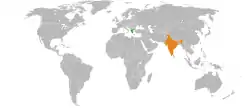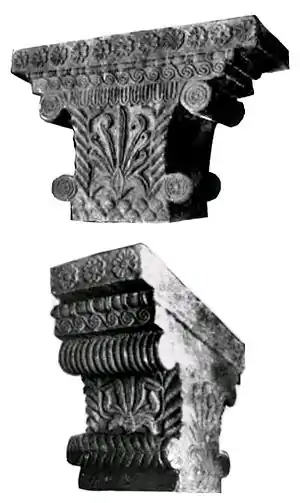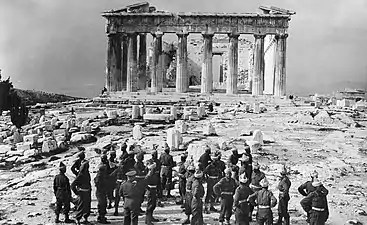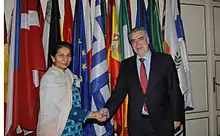Greece–India relations
Greco-Indian relations are the relations between Greece and India. Greece has an embassy in New Delhi and three honorary consulates in Kolkata, Chennai and Mumbai. India has an embassy in Athens and an honorary consulate in Thessaloniki. As of 2020, the relation between the two countries is closer than ever and is considered historical and strategic by both parts.[1][2]
 | |
Greece |
India |
|---|---|
Historical relations
Ancient era

For the Ancient Greeks "India" (Greek: Ινδία) meant only the upper Indus till the time of Alexander the Great. Afterwards, "India" meant to the Greeks most of the northern half of the Indian subcontinent. The Greeks referred to the Indians as "Indói" (Greek: Ἰνδοί), literally meaning "the people of the Indus River". Indians called the Greeks Yonas or “Yavanas”[3] from Ionians.[4]
18–19th century
There is now tangible evidence indicating that the settlement of Greek merchants in Bengal must have begun as early as the beginning of the seventeenth century.[5] Dimitrios Galanos (Greek: Δημήτριος Γαλανός, 1760–1833) was the earliest recorded Greek Indologist. His translations of Sanskrit texts into Greek made knowledge of the philosophical and religious ideas of India available to many Europeans. A "Dimitrios Galanos" Chair for Hellenic Studies was established at Jawaharlal Nehru University in New Delhi, India in September 2000.
Modern

Relations between Greece and India started in May 1950. India opened its resident Embassy in Athens in March 1978. The new Greek Embassy building in New Delhi was inaugurated on 6 February 2006.
Three Indian companies were having partners in Greece and 15 Greek companies are operating in India.
The graves of Indians who died in Greece during the two World Wars are located in the memorial grounds of the cemeteries of the Allied Forces in Athens and Thessaloniki.
Thessaloniki was twinned with Kolkata at January 2005.
About 12,000–13,000 Indian people live in Greece.
India and Greece enjoy close bilateral relations and annual bilateral trade stands at $0.70 billion. India has been an honored country at the 74th (2009)[6] and the 84th (2019)[7] Thessaloniki International Fair. The first Greek Indian Business Association was established in Athens in June 2019.[8]
List of recent bilateral visits
- In March 1982, the President of the Hellenic Republic, Konstantinos Karamanlis, paid an official visit to India.[9]
- In December 2000, Greek Foreign Minister George Papandreou visited India.
- In February 2001, Prime Minister of Greece Kostas Simitis visited India.
- In September 2006, Speaker of the Lok Sabha Somnath Chatterjee visited Greece.
- In February 2007, Greek Finance Minister Georgios Alogoskoufis Visited India[10]
- In April 2007, President of India Avul Pakir Jainulabdeen Abdul Kalam made an official visit to Athens.[11]
- In January 2008, Prime Minister Kostas Karamanlis visited India[12]
- In December 2015, Greek Defence Minister Panos Kammenos visited India[13]
- In April 2018, India's State Minister of Agriculture Shri Gajendra Singh Shekhawat visited Greece[14]
- In June 2018, President of India Ram Nath Kovind made an official visit to Athens.[15]
- In September 2019, India's Minister of Commerce and Industry Hardeep Singh Puri visited Greece and Inaugurated the Indian Pavilion in Thessaloniki International Fair[16]
List of bilateral treaties

- Agreement on Cultural Exchange, 1961
- Agreement on Avoidance of Double Taxation, 1967
- Agreement for Joint Commission for Economic, Scientific and Technical Cooperation, 1983.
- Joint Business Council of FICCI and ASSOCHAM and the Athens Chamber of Commerce, 1996.
- Agreement of Co-operation between Hellenic Foreign Trade Board and India *Trade Promotion Organisation, 1996.
- Agreement on Tourism Cooperation, 1998.
- MoU on Defence Cooperation, 1998.
- MoU for Cooperation in Agriculture, 2001.
- Agreement on Promotion and Reciprocal Protection of Investments (BIPA), 2007.
- Agreement on Co-operation in Science & Technology, 2007.
- MOU between CII and Federation of Greek Industries, 2007.
- MOU for Co-operation between Institute of Science, Bengaluru and *National Technical University of Athens (NTUA), 2007
References
- https://greekcitytimes.com/2020/10/30/india-greece-historical-friendship/
- https://greekcitytimes.com/2020/11/15/indian-fm-greece-strategic-partner/
- The Influence of Greek Classics on Indian Culture in Ancient Era
- YAVANAS IN THE ANCIENT INDIAN INSCRIPTIONS
- "Three Centuries of Hellenic Presence in Bengal". 31 December 2005.
- "India - Honored Country in the 74th Thessaloniki International Trade Fair". 9 September 2009.
- "India Honored country at the 84th Thessaloniki International Fair". 6 September 2019.
- "GIBA | Greek Indian Business Association".
- "Official Visit of Constantinos Karamanlis in India". 8 March 1982.
- "Finance Minister Alogoskoufis Visits India". 11 February 2007.
- "H.E. The President of India Dr. Abdul Kalam in Greece". 27 April 2007.
- "Official Visit of P.M. Kostas Karamanlis to India". 11 January 2008.
- "Greek Difence Minister Panos Kammenos visits India". 20 December 2015.
- "Visit of India's State Minister of Agriculture Shri Gajendra Singh Shekhawat to Greece". 18 April 2018.
- "Visit of President of India Shri Ram Nath Kovind to Greece". 13 June 2018.
- "Thessaloniki International Fair – Inauguration of the Indian Pavilion". 6 September 2019.
Further reading
- "India in Greece" by E.Pococke (1852)
- "The Greeks in India" by Demetrios Th. Vassiliades (2000)
- "The shape of Ancient Thought: Comparative Studies in Greek and Indian Philosophies" by Thomas McEvilley
- "Greeks and Buddhism" by Demetrios Th. Vassiliades (2016)
- Kazanas, Nicholas. "Archaic Greece and the Veda." Annals of the Bhandarkar Oriental Research Institute 82.1/4 (2001): 1–42.
- Kazanas, N. "Advaita and Gnosticism." Indian Historical Review 32.1 (2005): 197–254.
- Kazanas, Nicholas. "Renaissances with Vedic Vaāk and Hellenic Logos." IUP Journal of History & Culture 4.4 (2010).
- Kazanas, N. 2004 ‘Plato and the Upaniṣads’ in Brahmavidyā: Adyar Library Bulletin.
- Swarup, Ram (2000). " India and Greece" In: On Hinduism: Reviews and reflections. New Delhi: Voice of India.
- Timothy Lomperis, Hindu Influence on Greek Philosophy: The Odyssey of the Soul From the Upanishads to Plato
- Meenakshi Jain, The India They Saw : Foreign accounts (co-edited with Sandhya Jain, 4 Volumes, Prabhat Prakashan), ISBN 8184301065, ISBN 8184301073, ISBN 8184301081, ISBN 818430109X.
- Majumdar, R. C. (1981). The Classical accounts of India: Being a compilation of the English translations of the accounts left by Herodotus, Megasthenes, Arrian, Strabo, Quintus, Diodorus, Siculus, Justin, Plutarch, Frontinus, Nearchus, Apollonius, Pliny, Ptolemy, Aelian, and others with maps. Calcutta: Firma KLM.
